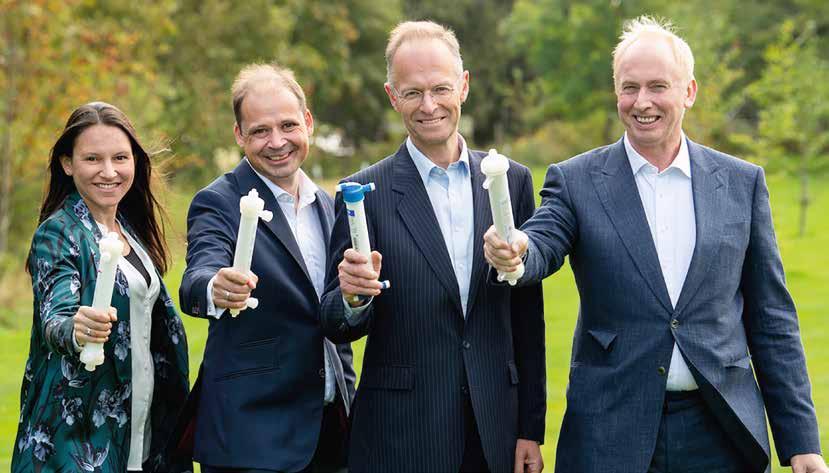
3 minute read
their patients A new healthcare paradigm: Using AI in the nervous system to manage chronic conditions
A new healthcare paradigm: Using AI in the nervous system to manage chronic conditions
Contributed by Emil Hewage (co-founder and CEO) and Oliver Armitage (co-founder and Chief Scientific Officer), BIOS Health
AI is arguably powering a healthcare revolution. Everywhere you turn, there’s commentary about the role AI can play in transforming healthcare by making health services more efficient, improving diagnostics and patient outcomes, and giving people more control over their health. Increasingly there are practical examples, the majority of which are evolutionary, iterative enhancements to existing services.
But what if we set our sights higher for using AI – to create a new generation of therapies, and a new paradigm for healthcare?
At BIOS, it is our mission to transform healthcare by developing a full-stack neural interface platform, that is optimised to decode and encode the signals from the brain to the body, to treat chronic health conditions. Our vision is that patients will have their chronic conditions managed via the nervous system directly by AI, giving personalised and accurate treatments, making the burden of pills and doctor visits a second resort rather than a daily reality.
The need is great to find step-change solutions. Chronic diseases account for almost 90 per cent of all deaths and nearly $2 trillion in healthcare spend per year in Europe and the US alone. Yet ROI in pharmaceuticals to tackle these challenges is decreasing, costing billions more every year to bring fewer drugs to market. We need ways to develop treatments that are more effective, cost less to deliver and do this more quickly if we are to tackle the burden of chronic diseases and provide greater quality of life for millions of people. Scientists have long known that faulty signals in the nervous system play a key role in driving chronic diseases. A major bottleneck has been the speed and accuracy with which scientists could discover and recreate the exact neural signal patterns (biomarkers) capable of affecting our health.
Previously there was no way to leverage the nervous system in this way because we were not able to process or analyse the vast amounts of data and complexity within it. But now, BIOS has combined neuroscience and artificial intelligence, software engineering and medicine to develop the capability to decode and encode the signals going from the brain to the body.
There are three parts to our technology:
1. BIOS’s standardised hardware interface connects directly with the nerves to isolate the signals that travel between the brain and the body.
2. BIOS’s AI decodes and encodes this neural information from hundreds of thousands of individual neurons, tens of thousands of times per second, and sends corrected signals back into the body.
3. Using this neural code, BIOS can build a whole digital healthcare treatment though software that continuously updates, trains and enhances the treatment, via the cloud.
We have pioneered a method to automatically extract the neural signals regulating physiological biomarkers using an AI-enabled neural interface – creating a new way of investigating conditions that will accelerate the discovery of neural biomarkers, and making us the first to automatically isolate biomarkers in neural data
This breakthrough has made it possible to understand the “language” of the nervous system for the first time. Using machine learning to find biomarkers of organ function in neural data and be precise about which nerve activity relates to a specific condition will mean effective neural treatments can be developed to replace drugs. This neural approach can be used for some of the most life-threatening or debilitating chronic conditions including hypertension, diabetes, and rheumatoid arthritis, and in the future potentially diseases of the brain itself such as Parkinson’s or Alzheimer’s. We’re focused on building a platform technology that enables third parties to create neural treatment applications using our AI technology.
Heated debate on the future of AI-powered healthcare and what it should look like will continue. But for us, it’s about realising our vision for a future where we can scale effective, cost-efficient, and personalised care to millions of patients with chronic conditions – changing their lives in the process.








